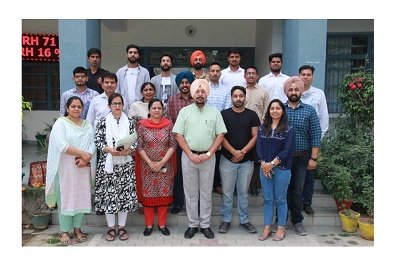Technologies for sustainable agriculture
Smallholder farmers in India can be a significant contributor in our sustainability journey. Technology and innovation have always been important for sustainable farming, from the high yielding varieties of green revolution to more recent adoption of Bt cotton. With these and other technologies like agronomic practices, combined with synthetic inputs, we saw a steady increase in crop productivity over the last decades. In recent years, this increase in crop productivity has plateaued and some of these practices have also left a large environmental footprint. Coupled with the water crisis and the climate crisis we find ourselves in, our smallholder farmers will be disproportionately affected by adverse climate events with respect to productivity and their livelihood at large. By Usha Barwale Zehr, Vikas Chandak and Umang Agrawal, Grow Indigo
Sustainable Agriculture is actually a cost effective and scalable solution to some of these challenges and additionally can offer a new source of income, and more resilience to adverse climate events.
At Grow Indigo (a partnership between Mahyco and Indigo Ag), we are focused on bringing technologies that are sustainable in these smallholder agri systems. The policies of Government of India further supports some of these initiatives like the inclusion of bio-stimulants with synthetic fertilisers or other chemicals to ensure low chemical residue harvest. Recent advances in the microbial input space are providing a promising alternative to the synthetic solutions which have been historically available. Some examples include,use of biofertiliser that are specially formulated to provide maximum benefit for a given crop (Prerak soya, cotton, pulses, wheat and other seed treatments), Soil application formulations like Oorjit Granule and Growrrhizae, biopesticides like Colossal and Bhujbal, foliar nitrogen fixers, plant growth promoting microbes and endophytes which provide enhanced Nutrient Use Efficiency, Water Use Efficiency, abiotic stress tolerance to various crops. Our partner, Indigo Ag has focused on endophytes, with a library of more than 40,000 endophytes and seeds treated with this class of treatments, providing stress tolerance be it drought, water use and other stresses. The smallholder farmers have become more and more aware about the benefits of the consortia treatments that Grow Indigo offers to address various challenges faced by them. With increasing use of these innovative inputs, the impact on soils, water quality and greenhouse gas (GHG) emission will be improved leading to an overall positive impact on agriculture while not impacting the productivity of the crop negatively.
Climate change has posed a significant threat to agri-food systems, especially in highly vulnerable smallholder farming regions like India. While agriculture contributes about 16 per cent of gross GHG emissions in India, it is also a substantial sink for mitigating climate change through regenerative farming practices. Practices like direct dry seeding of rice, reduced tillage, nutrient management and more have the potential to reduce the GHG emissions in addition to improving soil organic carbon, thus making agriculture the most efficient and scalable solution in addressing climate change. In smallholder farming systems, the beneficial effects of coupling these practices with voluntary carbon markets also provides an opportunity for farmer income enhancement.
Much work has been done on conservation agricultural practices in different agro ecosystems. However, the regenerative agricultural practices today are implemented only by a small percentage of farmers. These practices include, minimal tillage, cover cropping, crop diversification, use of biofertilisers, and perennial cropping, among others, which increase soil’s carbon content, water permeability, and water retention, which also increase a crop’s ability to withstand drought, flooding and temperature stresses. As per expert estimates, regenerative farming practices, combined with increased penetration of new technologies, have the potential to return the carbon levels in agricultural soils from an average of ~0.5 per cent back to ~1.5 per cent.
To catalyse the adoption of regenerative agriculture, Grow Indigo has launched a project in Punjab and Haryana which enrolls farmers in a carbon farming programme, ultimately allowing them to participate in a voluntary carbon marketplace. The monetary incentive from this programme will motivate the farmers to implement regenerative farming practices. Use of digital agronomy tools and satellite imagery analysis to measure and verify soil carbon sequestration and on-farm GHG emission levels will be essential for scaling such projects.
The objective is to pay farmers for increasing the carbon content of their soil and reducing overall GHG emissions. We are working with our partners to identify and implement regenerative practice changes, and measure the impact of those practices in terms of tonnes of carbon sequestered or GHG emission reductions. Once the impact has been verified, farmers are paid based on the amount of Carbon sequestration/GHG reduction after the carbon credits are issued and traded. Carbon credit, which is one tonne CO2 equivalent of GHG emission reduced or carbon stored in the soil, can be thought of as a data product, where the veracity, transparency, and traceability of the data has a direct implication on the quality of the carbon credit. Quality of the carbon credit is critical to get the right price for the carbon credit generated, and monitoring and verification at scale is important to make the system work in smallholder systems. Once the farmers register in the programme and continue to implement the regenerative agri practices, they will be eligible to receive payment for carbon credits generated for 20 years, conditional upon following these climate-smart practices in future.
Grow Indigo has already registered with Verra (a global leader in Carbon credit verification) and has initiated a project to start the carbon credit generation activities. With the project, Grow Indigo is enrolling farmers in the programme in partnership with Indian Council of Agricultural Research (ICAR)-Indian Agricultural Research Institute (IARI) and International Maize and Wheat Improvement Center (CIMMYT) to promote practices which enhance sustainability and regenerative agriculture.
This programme creates an additional income avenue for the farmers, and contributes positively in our efforts for sustainability in the long run.
Agriculture digitisation is also paving the way for knowledge dissemination and sharing. Farmer advisories which are on mobile platforms are changing how farmers access information and such information is becoming available almost in real time. These digital technologies are also strengthening data which is being deployed to better design and implement timely and actionable advisories related to agronomy and agriculture marketing.
These are just a handful of examples of how technologies will shape the future of agriculture in the near term and get us closer to our sustainability goals. What we do today determines what the future will look like, and agriculture will be a positive contributor if we strengthen the above sustainability practices.
Smallholder farmers in India can be a














